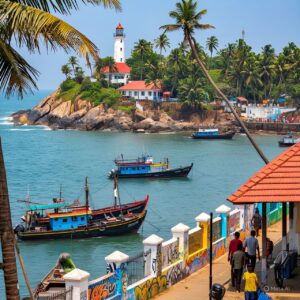
Kerala’s coastal towns, long celebrated for their natural beauty and cultural richness, are now becoming torchbearers for sustainable tourism in India. Facing the dual pressures of environmental degradation and the need to preserve local livelihoods, these communities are adopting eco-conscious practices that balance economic growth with environmental and social responsibility. Here’s how they’re leading the way:
1. Eco-Friendly Accommodation Initiatives
Many coastal towns like Kovalam, Varkala, and Bekal are witnessing a rise in eco-resorts and homestays that prioritize sustainability. These accommodations often use solar energy, rainwater harvesting, and biodegradable materials, while also promoting plastic-free stays. Some resorts even integrate local architecture and natural ventilation systems to reduce carbon footprints.
2. Responsible Waste Management
Plastic pollution has been a major concern along Kerala’s beaches. In response, local administrations and NGOs have initiated beach clean-up drives, installed waste segregation bins, and enforced strict anti-littering policies. For instance, Varkala has implemented a “Green Protocol” for events and tourism businesses, banning single-use plastics and encouraging reusables.
3. Community-Based Tourism
Local communities are at the heart of Kerala’s sustainable tourism model. In coastal areas like Mararikulam and Munroe Island, community-based tourism initiatives offer travelers authentic experiences—such as toddy tapping, fishing, and traditional coir-making—while directly benefiting local families. This model ensures tourism profits are reinvested locally, preserving both culture and livelihoods.
4. Conservation of Coastal Ecosystems
Efforts are underway to conserve fragile coastal ecosystems like mangroves and estuaries. Towns like Kumbalangi and Ashtamudi are promoting backwater tours that follow environmental guidelines, restricting motorboat usage and limiting tourist numbers. Nature interpretation centers and eco-tourism trails have also been set up to educate visitors on local biodiversity.
5. Promoting Slow and Mindful Travel
Kerala’s tourism department has been actively encouraging slow tourism—where travelers engage deeply with destinations over longer stays. Coastal towns offer yoga retreats, Ayurveda therapy, and local culinary workshops, allowing tourists to connect with the region in a meaningful and low-impact way.
6. Green Certification and Incentives
To promote eco-tourism practices, the Kerala government offers green certifications to hotels and tour operators that meet specific sustainability criteria. This not only incentivizes environmentally friendly practices but also helps tourists make conscious travel choices.
7. Promoting Sustainable Seafood Practices
Several coastal restaurants and fishing communities are adopting sustainable seafood practices, such as promoting seasonal and responsibly-caught fish. Awareness campaigns encourage both locals and tourists to avoid consuming overexploited species, helping to maintain marine biodiversity.
8. Training and Education for Locals
Workshops and training sessions on eco-tourism, waste management, and conservation practices are being offered to local businesses, fishermen, and tour operators. This grassroots education ensures that sustainability is embedded in the very fabric of the tourism experience.
9. Integration of Indigenous Knowledge
Local knowledge, such as traditional fishing methods and coastal farming practices, is being integrated into tourism offerings. This not only preserves heritage but also showcases sustainable living techniques that have existed for centuries.
10. Cycling and Walking Tours
To minimize carbon emissions, many coastal towns are promoting cycling and walking tours. Towns like Fort Kochi and Alappuzha offer heritage trails, mural tours, and beach walks, encouraging travelers to explore destinations without relying on motorized transport.
11. Revival of Traditional Arts and Crafts
Handicraft cooperatives and artisan workshops are being revived to showcase local crafts like coir products, handloom textiles, and pottery. Tourists are encouraged to buy local, handmade products, supporting sustainable livelihoods.
12. Partnerships with NGOs and Eco-Activists
Many sustainable tourism efforts are being strengthened through partnerships with environmental NGOs and activist groups. Collaborative programs help monitor the health of beaches, marine ecosystems, and waste management systems.
13. Eco-Friendly Water Sports and Activities
In some coastal towns, water sports operators are now required to follow eco-friendly guidelines. Activities like kayaking, paddleboarding, and snorkeling tours are offered with minimal ecological impact, emphasizing respect for marine life.
Conclusion:
Kerala’s coastal towns are proving that tourism and sustainability can go hand in hand. By focusing on eco-friendly infrastructure, community engagement, and conservation, these destinations are creating a model that other regions can emulate. For travelers, this means more enriching experiences that support both the environment and the local people.

Leave a Reply